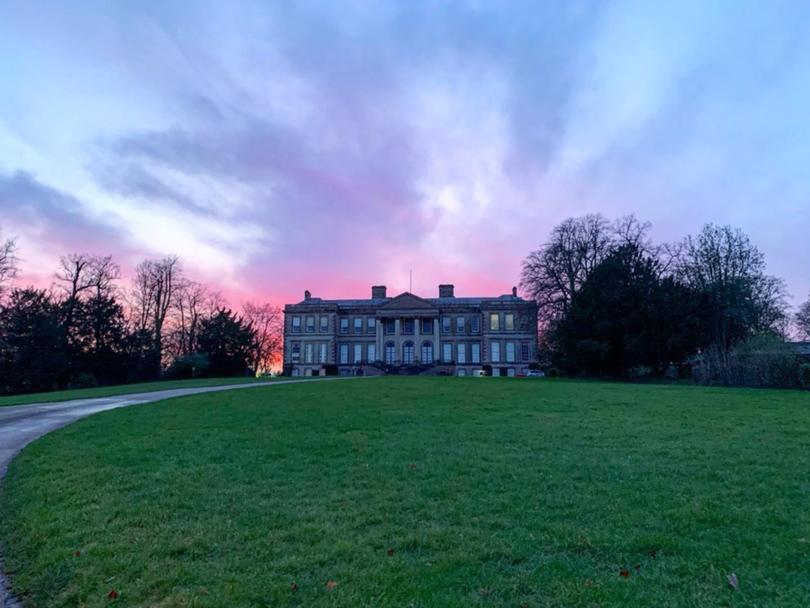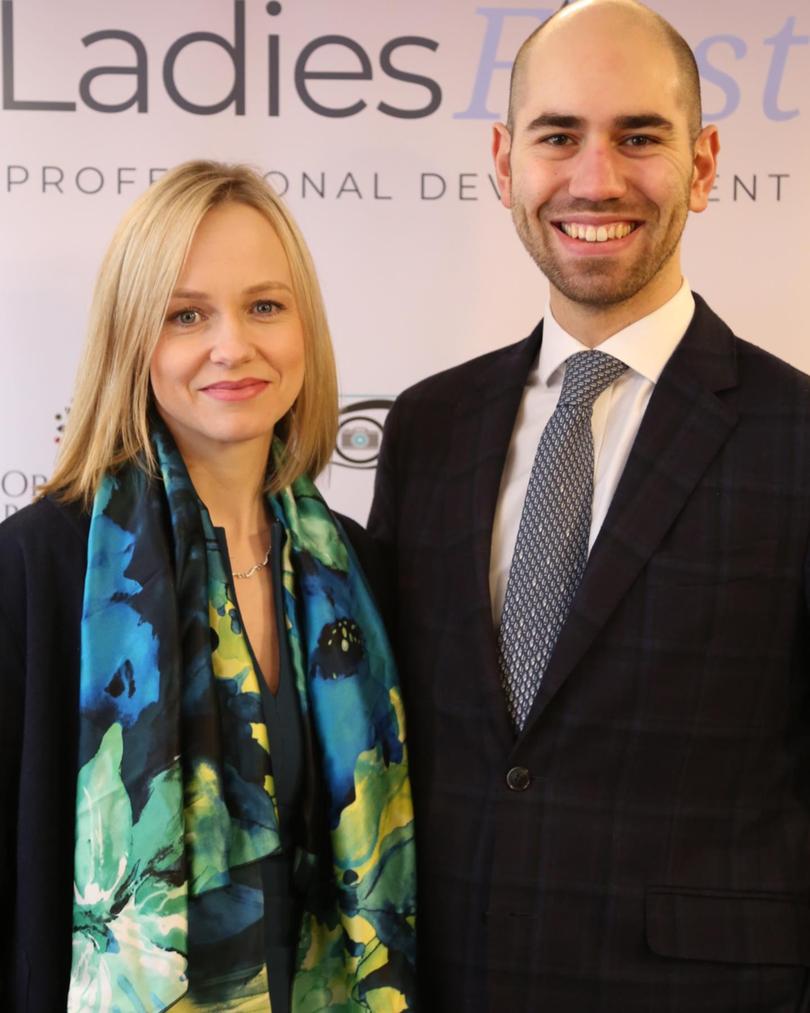Earl of Yarmouth locked in toxic legal battle with family over control of their £85 million ancestral estate
A ‘disgruntled’ craft-brewing earl is locked in a court feud with his aristocratic family over control of their £85 million ($168 million AUD) ancestral estate — after claims his wife was ‘disrespected’.

A “disgruntled” craft-brewing earl is locked in a court feud with his aristocratic family over control of their £85 million ($168 million AUD) ancestral estate — after claims his wife was “disrespected” and he and his bride were forced out of their home.
William Seymour, the Earl of Yarmouth, has been involved in a public spat with his parents, the Marquess and Marchioness of Hertford, since 2018, when he married wife Kelsey — now Countess of Yarmouth a former Goldman Sachs banker.
Lord Yarmouth, now 32, had expected to inherit the 400-year-old family seat, Ragley Hall, in Warwickshire, as his parents’ oldest son, London’s High Court heard.
Sign up to The Nightly's newsletters.
Get the first look at the digital newspaper, curated daily stories and breaking headlines delivered to your inbox.
By continuing you agree to our Terms and Privacy Policy.But William’s marquess dad Harry, Lord Hertford, 66, says that “in the run up to and after his wedding to Kelsey...William’s relationship with his family deteriorated very sharply” after he asked his father to “hand over Ragley Hall to him when he turned 30” in 2023.
He also sent what his parents say were “hostile and inflammatory” emails to his marchioness mum Beatriz, Lady Hertford, 64, “questioning (his dad’s) mental capacity,” which they say caused “enormous upset and anger”.
Alongside this, there were clashes between the couple and the trustees controlling a large part of the 6,000 acre Ragley Estate, which is the source of the family’s wealth, with the earl and countess claiming amongst other things that the trustees refused to release funds for their two children’s private school fees.
The couple also say they were kicked out of their cottage home on the estate with just a few days’ notice.

Now after seven years of simmering dispute, the earl - who with his wife runs craft elderflower liquor distillery St Maur from part of the estate — is facing off against his parents and siblings in court, fighting to dismantle the structure controlling the trusts and remove the trustees, who he claims have sided with his parents.
He says that the “trauma” of having his expectations that he would “take over the estate” at 30 dashed has “upended” his life and he has needed “professional help and counselling to deal with trauma as a consequence.”
But lawyers for Lord and Lady Hertford and William’s three siblings, Lady Gabriella Seymour, 32, Lord Edward Seymour, 30, and Lady Antonia Seymour, 26, say William has behaved in an “unreasonable and vindictive” manner, and want the trusts left undisturbed, whilst those running the family trusts — the Ragley Trust Company Ltd and Seymour Trust Company Ltd — deny bias.
The court heard that the Seymour family, which indirectly descends from Henry VIII’s favourite wife, Jane Seymour, have had their family seat at Ragley, near Alcester, Warks, for around 400 years.
The 600-acre estate comprises a Robert Hooke Palladian mansion, working farms, businesses and properties, as well as woods and hundreds of acres of parkland, although the two trusts do not run the house itself.
William, who the court heard had already been passed estate land and property worth over £4m by the time he was 21, had “little interest in the estate or the trusts” until 2017, the family’s barrister Richard Dew said.
But after getting together with his financier wife Kelsey, he “started to assert himself,” with the couple asking to be given financial information about the estate and to attend management meetings, he said.
This led to complaints from William about his ideas about how the estate should be run being disregarded and “disrespect” being shown to his wife, by not inviting her to a trustee meeting.
At the same time, relations with his family were nosediving, “the culmination seeming to be an extraordinary email sent by (William) to his mother suggesting that his father was incapable,” Mr Dew said.

Tim Sherwin — barrister for the two family trusts — claimed William had sparked conflict with his dad by raising the topic of his succession as the oldest son and heir.
“Harry’s account is that William asked him to confirm that Harry would hand over Ragley Hall to William when William turned 30, i.e. in late 2023,” explained Mr Sherwin.
“Harry says he was disappointed with William’s lack of achievements, and that the tipping point in their falling out was a letter from William sent on 25 July 2018 to (Lady Hertford) questioning Harry’s mental capacity.”
William had attended Cirencester Agricultural College, although he “dropped out after a year,” said the barrister, and “he has not since obtained any professional or other qualifications.”
But William says the problems were caused between him and his parents after they appeared to stage a shock “volte face” by dashing his hope and expectation that he would inherit the estate while still a young man.
He had been rocked to receive an email from his Brazilian-born mother in March 2018, in which she told him: “As you know, darling, there are no funds available for supporting two generations at the same time and you should prepare for that.
“There are no obligations as to when or what is handed over. Ragley was passed to your father when he was 33 because your grandfather, then 61, saw fit.
“Nowadays, retirement happens later and people live longer. Our concern is you don’t seem to be taking it all in; as if you were somehow expecting Ragley to fit within your needs.”

The court heard William claims he has never been given an explanation and that, as a result, his “position, circumstances, and needs had been changed profoundly in 2018.”
A deep rift has resulted, which has grown worse over the years, with William and his wife on one side and his parents and siblings on the other, with — William claims — the trustees siding with his parents.
Incidents include William suing the trusts to force them to release a large parcel of estate woodland to him — with a row about access rights ongoing - and claims that he and his wife were ejected from their estate cottage and “given only six days’ notice to leave, leaving him without a home to go to”.
The couple also say the trusts refused to release money for their two children’s private school fees, though the trustees’ lawyers insist they needed more information from the couple in order to do so.
William is now seeking to have the trusts dismantled, with trust companies removed and replaced with independent professional trustees on the basis that their relationship has broken down.
His barrister, Paul Burton, said the trustees had contributed to family strife and misdirected the estate, telling the court: “I can’t say that the trustees did this or that and so caused the family breakdown - I can say that the trustees are a problem and have exacerbated it and fuelled it.”
Backing the trusts’ case, Mr Dew, for William’s parents and siblings, said that since 2018, he had done “many things which on any basis would make the trustees cautious in their dealings with him”.
These acts included the litigation over the Ragley Woodland, blocking access and “trying to obstruct and disrupt estate events,” he said.
There had also been incidents in which he “surreptitiously recorded meetings and calls, both with the trustees and with staff members,” said the barrister.
He also rejected the earl’s accusation that he and Kelsey were left without a roof when asked to leave their estate cottage, telling the judge: “This is an example of his tendency to exaggerate, and frankly embellish, his evidence.”
He told the judge that “for the early part of his life and probably up until at least 2017, the claimant was regarded by his parents and siblings as the likely successor to the assets owned by Lord Hertford”.
But “in 2017 and 2018, the claimant began to assert himself in a way that, in hindsight, may have been designed to engineer a breakdown in family relationships.
“Whether that was the intended outcome, that was what happened, the culmination seeming to be an extraordinary email sent by the claimant to his mother suggesting that his father was incapable,” he continued.
“These emails were hostile and inflammatory documents, and the claimant must have realised that they would cause enormous upset and anger.
“The claimant was successful in that, because the evidence suggests that they led directly to a breakdown in the family relationships.”
But William’s barrister told the judge, Master James Brightwell: “This is not a family dispute. This is a claim against the trustees for their removal.
“That the relationship of trust and confidence between the claimant and the trustees has irretrievably broken down is beyond argument.
“There is no prospect of these outstanding matters being resolved while the trustees are in office.”
Mr Dew, for the family, said removal of the trustees will be to the detriment of the estate, as their years of experience and personal relationships with the staff will be lost and fees for replacements will be more expensive.
“It is denied that the relationship (with the trusts) has been destroyed,” he said. “The claimant confuses his relationship with his immediate family members with the one he has with the trustees.
“The claimant has acted vindictively and unreasonably, yet the trustees remain willing to work with him.
“There is no doubt that there is a breakdown in the relationship between the claimant and his immediate family. The claimant’s mistake is to elide that breakdown as if it were also a breakdown in his relationship with the trustees.”
Master Brightwell has now finished hearing the case and will give his ruling at a later date.
-- Champion News Service Ltd
